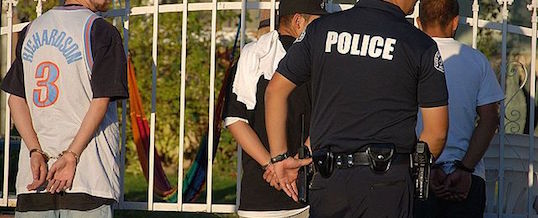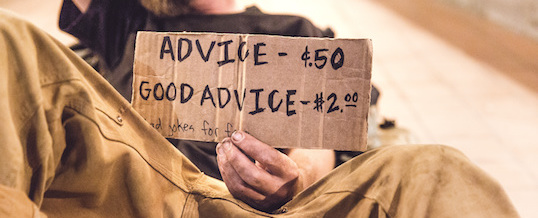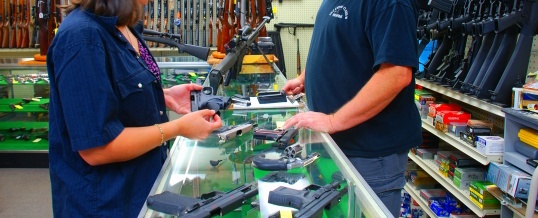
“We face the same criminals the police do!” Yes, but…
Every once in a while I see the tired old cliché “we face the same criminals the police do!” It’s usually used to justify some particular type of defensive firearms training, too often centered around the trainer’s police experience.
The idea, of course, is that we need to adopt the attitudes, tactics, and armament of law enforcement. (If you know anything about typical police training, it’s usually substandard — so much so that cops themselves joke about it. With rare exceptions, it’s nothing to aspire to yet some still do.)
On face value that seems to be a true statement. The police track people who commit crimes and we therefore share the commonality of interacting with the same people. After all, the police wouldn’t have a job to do if there were no victims and it takes a criminal to make a victim. Who could argue with that?
It’s a leap, however, to go from the idea that because the person is the same, the circumstances are as well. It’s the circumstances that make all the difference.
Context is everything
When we have contact with criminals, it’s usually because they want something from us (resource predation.) Absent true derangement or chemical impairment, they usually take what they want and leave. In the majority of cases a show of force by the victim, whether through the use of weapons or simply by a resolute attitude, persuades them to break off their actions. They know we’re quite unlikely to pursue them (and it’s usually stupid of us to do so.) There is no downside, other than perhaps saving face, to break off an attack and live to attack another day.
Contrast that with an interaction with law enforcement. The job of the police is to pursue and apprehend, and they will do so pretty relentlessly once they’ve identified a suspect. The predator has a vested interest in not being caught and might resort to extreme measures to avoid it. That includes attacking his pursuers with whatever weapons he has at his disposal. If he’s facing a long mandatory jail sentence, or is a “three strikes” convict, avoiding arrest becomes even more important to him. The weapons the police have, and their threats to use them, may be seen as less onerous than what they face if caught.
The criminal also knows that the police have rules of engagement, and they’re usually well understood. The private citizen? We’re a wildcard. The criminal is less likely to take chances with us because he doesn’t know how we’ll react to his threat. If his victim says, with conviction, “I’ll shoot!” he can probably be sure that a loud noise is imminent. At the very least, there is enough doubt in his mind that he might just take the option of leaving — and, if the data we have is accurate, that’s what he usually does.
On the other hand, he knows how far he can push the police. He knows how they escalate force (and that they’re required to) and is therefore less likely to stop his behavior when confronted with a mere verbal command. He’s often physically violent with the cops even if his crimes against citizens have been non-violent.
The criminal also encounters police in a more predictable climate: they’re looking for him, they find him. They’re ready for some sort of encounter (even if they don’t know exactly what it will be or exactly when it will happen.) They’re hunting and waiting for the quarry.
When we encounter the bad guy, we’re the quarry.
When you put all that together, it’s no wonder the experienced criminal is likely to be a dangerous thing to a police officer. It’s why they call for backup, have lots of tools at their disposal, and use force multipliers like attack dogs and flash-bang grenades. It also explains why most attacks on armed private citizens are resolved without a shot being fired.
Yes, the police encounter the same guys we do — but their encounters are under different circumstances, involve different motivations, and will likely end differently than ours.
We need different training than the police
None of this should be construed as an argument that the private citizen needs to accept poor training or substandard weapons. I’m not, for instance, suggesting that the police “deserve” higher capacity weapons or that we should be denied them because we don’t have a “need”.
What I am saying is that basing our training on what the police do is a recipe for failure. The police are proactive; we need to be reactive. We don’t necessarily need to learn how to search a building; we need to know how to to keep criminals out in the first place. We need to learn to defend ourselves from the ambush attack, not how to set up the ambush.
In the case of the citizen defender, we need defensive techniques that help us to avoid the criminal in the first place, and in case that doesn’t work how to respond when attacked unexpectedly. We need to learn how to integrate self defense into our lives, lives which are usually spent doing things completely unrelated to bad guys. None of that looks like what the police need to learn how to do, even if it involves the same criminal.
Don’t be taken in by simplistic assertions. Think about what you’re being told and don’t accept the conclusion simply because it plays to your fears. And don’t be impressed that you’re getting “the same” training as the police (or even “better” training.) You need “different” training, because your life is different.
And you’re the only one responsible for protecting it.
– Grant Cunningham
Photo: Wikimedia Commons
Now you can LISTEN to the blog!
- Posted by Grant Cunningham
- On September 9, 2016



